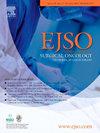Influence of lymphadenectomy extent on the efficacy of immunotherapy in recurrent gastric cancer patients
IF 2.9
2区 医学
Q2 ONCOLOGY
引用次数: 0
Abstract
Background
Current guidelines recommend ≥16 lymph node (LN) dissection for gastric cancer, preferably >30. However, optimal LN count for immunotherapy after recurrence remains unclear.
Methods
Retrospective study of 147 gastric adenocarcinoma patients receiving immunotherapy for postoperative recurrence (2017–2023). Participants were grouped by dissected LN (DLN) count. Outcomes included progression-free survival (PFS), overall survival (OS), and objective response rate (ORR).
Results
We collected data from 147 patients and stratified them into three groups by DLN count. Stratification revealed: Group A (DLN≤15, 6.1 %, n = 9), Group B (16–30, 44.2 %, n = 65), and Group C (>30, 49.7 %, n = 73). The median disease-free survival (DFS) post-initial surgery was 19.0 months. PFS under immunotherapy differed significantly: Group A (6.0 months) had worse outcomes than B (8.0 months), while C showed intermediate results (7.0 months; P = 0.017). OS followed a similar trend, with Group B having the longest median survival (18.0 months vs. 14.0 for A and 13.0 for C; P = 0.223). ORR was 34.0 %, with progressive disease (PD) more frequent in Group C (30.1 % vs. 20.0 % in B; P = 0.244). Multivariate analysis confirmed DLN count as the sole independent predictor of outcomes.
Conclusion
DLN count exhibits a U-shaped association with immunotherapy efficacy: both insufficient (≤15) and excessive (>30) dissection correlate with poorer PFS/OS versus moderate resection (16–30). Inadequate lymphadenectomy may cause stage migration, while excessive dissection could disrupt antitumor immunity. Precision lymphadenectomy balancing oncologic radicality and immune preservation is advocated.
淋巴结切除程度对胃癌复发患者免疫治疗效果的影响
背景:目前的指南推荐≥16淋巴结(LN)清扫术治疗胃癌,最好是≥30。然而,复发后免疫治疗的最佳LN计数仍不清楚。方法回顾性分析2017-2023年147例接受免疫治疗的胃腺癌术后复发患者。参与者按解剖LN (DLN)计数分组。结果包括无进展生存期(PFS)、总生存期(OS)和客观缓解率(ORR)。结果收集147例患者资料,按DLN计数分为3组。分层:A组(DLN≤15,6.1%,n = 9), B组(16-30,44.2%,n = 65), C组(>30, 49.7%, n = 73)。初始手术后中位无病生存期(DFS)为19.0个月。免疫治疗组PFS差异有统计学意义:A组(6.0个月)较B组(8.0个月)差,C组(7.0个月,P = 0.017)居中。OS也有类似的趋势,B组的中位生存期最长(18.0个月,a组14.0个月,C组13.0个月;P = 0.223)。ORR为34.0%,进行性疾病(PD)在C组更为常见(30.1% vs. 20.0%; P = 0.244)。多变量分析证实DLN计数是预后的唯一独立预测因子。结论dln计数与免疫治疗疗效呈u型相关性:与中度切除相比,dln清扫不足(≤15)和清扫过多(>30)与较差的PFS/OS相关(16-30)。不充分的淋巴结切除可引起分期转移,而过度的清扫可破坏抗肿瘤免疫。主张精确的淋巴结切除术,平衡肿瘤的根治性和免疫保存。
本文章由计算机程序翻译,如有差异,请以英文原文为准。
求助全文
约1分钟内获得全文
求助全文
来源期刊

Ejso
医学-外科
CiteScore
6.40
自引率
2.60%
发文量
1148
审稿时长
41 days
期刊介绍:
JSO - European Journal of Surgical Oncology ("the Journal of Cancer Surgery") is the Official Journal of the European Society of Surgical Oncology and BASO ~ the Association for Cancer Surgery.
The EJSO aims to advance surgical oncology research and practice through the publication of original research articles, review articles, editorials, debates and correspondence.
 求助内容:
求助内容: 应助结果提醒方式:
应助结果提醒方式:


